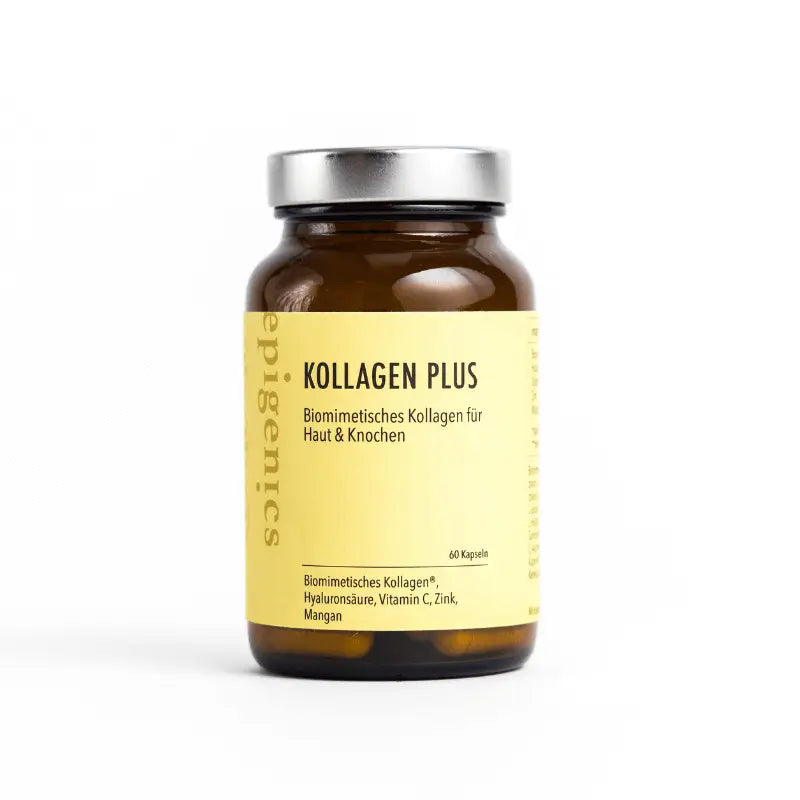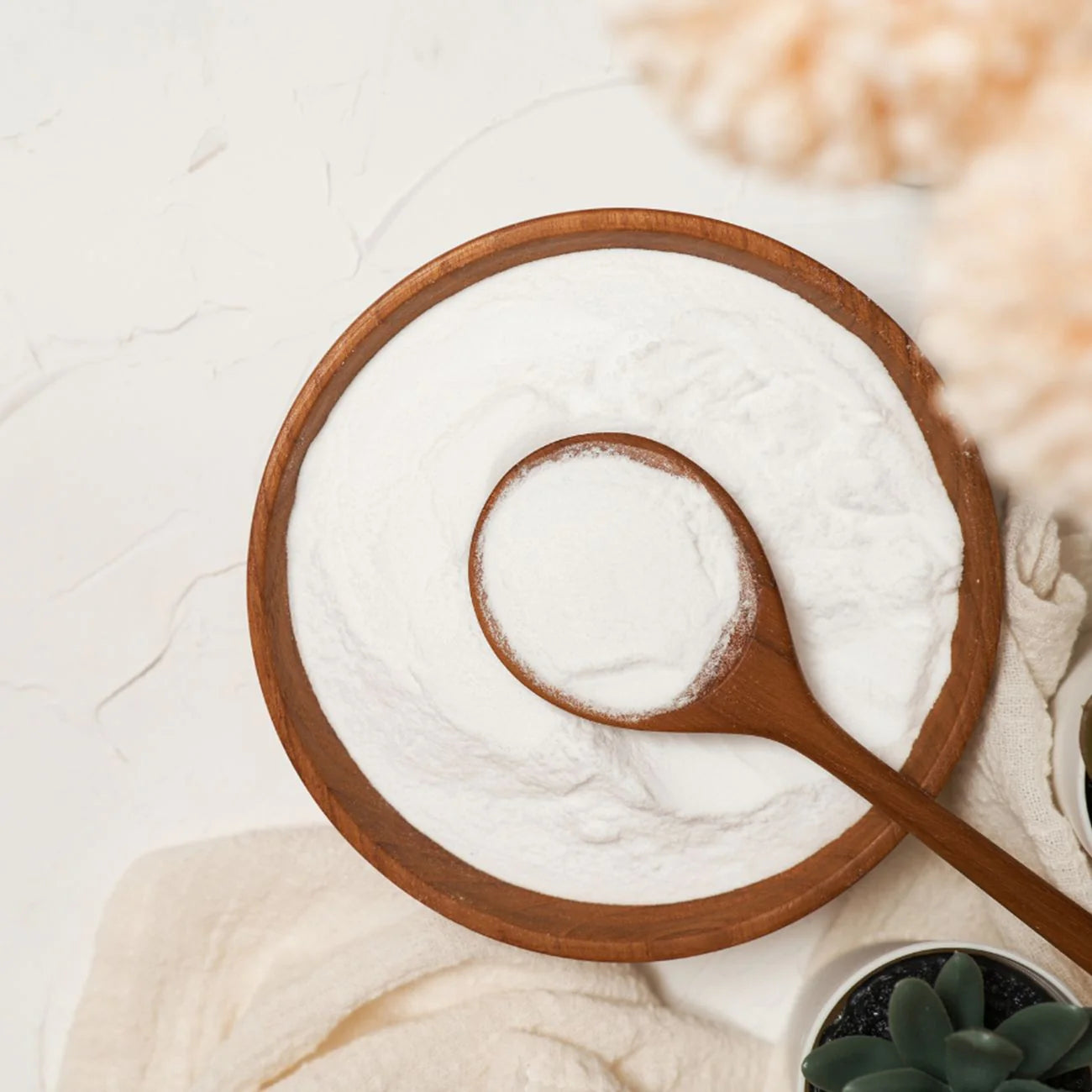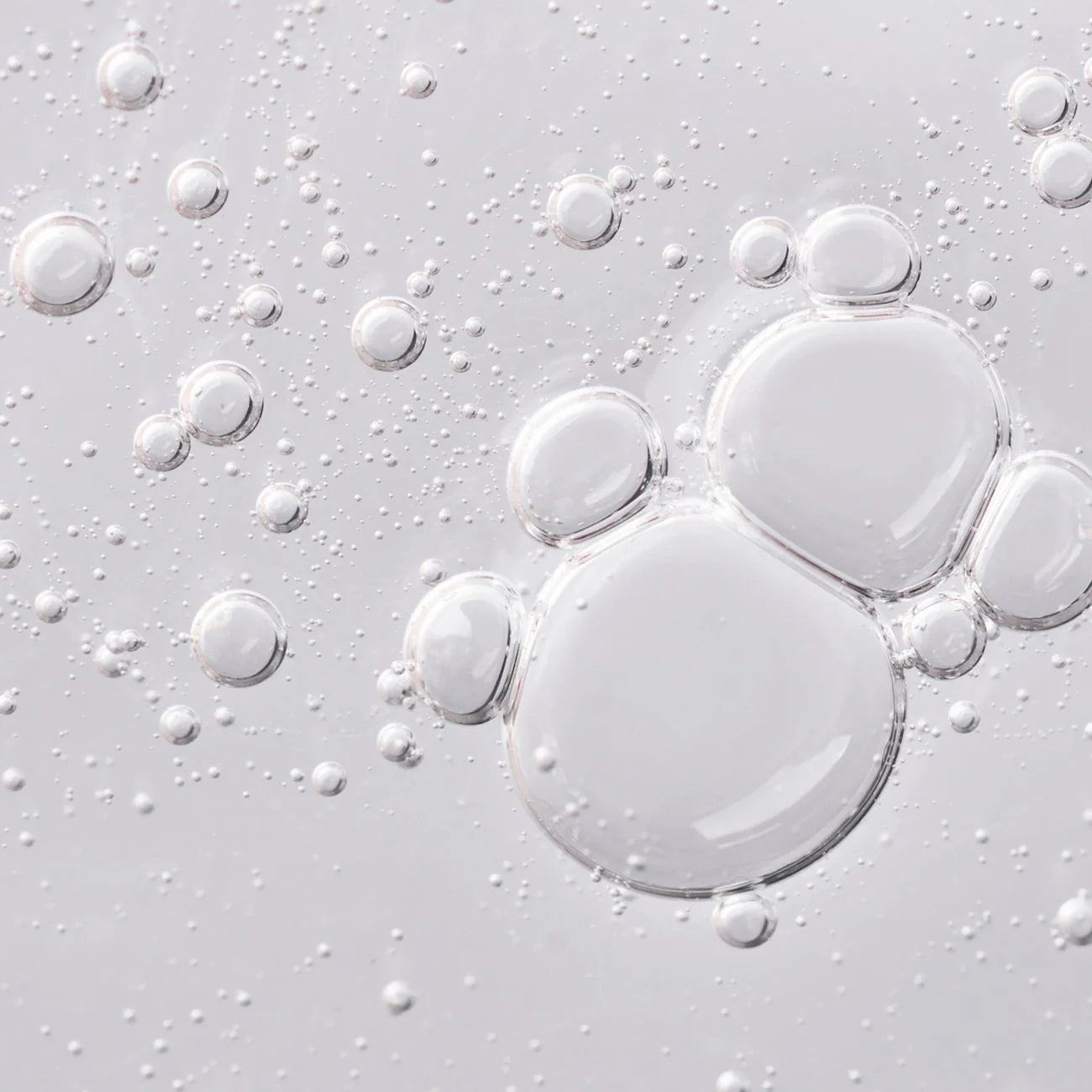Collagen Plus
Kollagen Plus: Für Haut, Haare und Gelenke
Amino acid composition that exactly mimics human collagen
Amino acids are provided in water-soluble and isolated form to optimize absorption
The use of plant source materials makes the product suitable for vegans
The biomimetic collagen® provides the building blocks to strengthen your bones
The combination of biomimetic collagen® and hyaluronic acid smoothes the skin and leaves it radiant
Biomimetic collagen vs. normal collagen
Carefully selected, evidence-based ingredients
What is Biomimetic Collagen®? Understand the science behind it
Biomimetic Collagen® is an advanced form of collagen supplement that consists of a specially formulated blend of amino acids. These amino acids are formulated in the exact ratio found in human collagen. Compared to traditional animal collagen, biomimetic collagen® offers three distinct advantages:
- Plant-based: the patented manufacturing process uses only plant-based starting materials.
- Optimal bioavailability: the amino acids contained are already isolated, making them easy for the body to absorb.
- Vegan and vegetarian friendly: This form of collagen is ideal for people who want to avoid animal products.
How does biomimetic collagen® support your skin health, youthfulness and bone density?
Collagen levels in the human body usually begin to decline around the age of 25. From this point on, collagen loss can be about 1% per year. During menopause, this loss can be even more dramatic for women, with rates as high as 2% per year(S). This progressive decline in endogenous collagen can promote various signs of aging, including wrinkling, decreased skin elasticity, and joint problems. Bone density can also be affected, increasing the risk of fractures and osteoporosis.
Scientific studies show that taking collagen supplements can have a significant impact on skin health. They can improve skin hydration, elasticity and density(S, S, S). Initial positive effects are usually noticeable after about three months of use. Because collagen peptides are taken orally, they can also reach the deeper layers of the skin, resulting in long-term improvements in skin physiology and appearance.
Aside from skin health, collagen supplements are also important for bone health. As we age, bone density decreases, increasing risks for osteoporosis and bone fractures. Studies have shown that collagen supplements can significantly increase bone density(S, S).
What is the dosage of biomimetic collagen® in Collagen Plus?
In each daily dose of Collagen Plus you will find 1006 mg of biomimetic collagen®. This blend contains plant-derived amino acids analogous to human collagen, including glycine, L-proline, hydroxyproline.
What is hyaluronic acid? Discover the miracle molecule for skin and joints
Hyaluronic acid is an essential molecule found in the skin and joints of our body. It plays a central role in hydrating the skin and maintaining joint mobility. Many are familiar with hyaluronic acid as a key ingredient in skin care products to combat signs of aging, but its effectiveness has also been proven when used internally.
How does hyaluronic acid support your skin health?
Hyaluronic acid supplements taken orally have the ability to improve skin texture and reduce the appearance of wrinkles(S). Additionally, the acid promotes joint health. It is an element of joint lubrication that minimizes wear and tear and acts as a shock absorber. The body produces less of this important acid with age, which increases the risk of joint problems and skin aging. Food supplements with hyaluronic acid can be useful in this regard(S).
What is the dosage of hyaluronic acid in Kollagen Plus?
In each daily dose of Kollagen Plus you will find 200 mg of hyaluronic acid.
What is vitamin C?
Ascorbic acid, better known as vitamin C, is an essential, water-soluble vitamin found in many natural food sources such as citrus fruits and berries. It is also available as a highly effective dietary supplement. Vitamin C is known for its immune-boosting and skin-rejuvenating properties and is indispensable for numerous physiological processes in our body.
How does vitamin C support collagen formation?
Vitamin C is an indispensable cofactor for certain enzymes such as prolyl hydroxylase and lysyl hydroxylase, which are active in collagen synthesis. These specific enzymes catalyze the hydroxylation of the amino acids proline and lysine, key components of the collagen molecule. Hydroxylation allows these amino acids to form stable collagen structures, which are important for skin, bone, and connective tissue(S, S). Insufficient vitamin C intake can compromise the efficiency of this process, thus reducing collagen quality.
In addition, vitamin C promotes wound healing and strengthens the skin barrier by promoting the production of ceramides, which improve moisture retention. Some studies have even shown that vitamin C can improve the effectiveness of sunscreens(S). Therefore, taking vitamin C as a dietary supplement may provide multiple benefits to the skin.
What is the dosage of vitamin C in Collagen Plus?
Our Collagen Plus formula contains an optimally balanced daily dose of 80 mg of vitamin C. This amount is designed to efficiently support collagen formation while strengthening the immune system.
What is Zinc?
Zinc is a vital trace element that plays a key role in over 300 enzymatic reactions critical to numerous physiological processes, including metabolism, protein synthesis and immune regulation. Although our bodies require minimal amounts of zinc, it has far-reaching effects on our health and well-being.
How does zinc support collagen formation?
In terms of skin health and collagen formation, zinc is essential. As an essential cofactor, it activates the enzyme collagenase, which is necessary for the orderly breakdown of old and damaged collagen. This creates space for new collagen to be produced and embedded. Zinc also supports key processes such as DNA synthesis and cell division that directly affect collagen-producing fibroblast cells(S, S). Thus, a zinc deficiency can inhibit collagen production and compromise skin health.
In addition, zinc is a critical factor in wound healing, in which collagen also plays a central role. Not only does it help stabilize collagen itself, but it also promotes the development of collagen fibers, which are critical for tissue repair. Zinc ions can even bind directly to the collagen structure to improve its stability and thus the integrity of the entire connective tissue(S).
What is the dosage of zinc in Collagen Plus?
The Collagen Plus formulation contains a targeted daily dose of 10 mg of zinc, which is designed to effectively support collagen synthesis as well as strengthen the immune system. Optimal zinc levels can thus contribute to improved skin health and bone density.
What is manganese?
Manganese is an essential trace element that occurs in small amounts in the human body but is necessary for a variety of biological functions. Manganese is a component of enzymes that play a role in various metabolic pathways, including the digestion of nutrients and energy production. It is also involved in bone formation, blood clotting and brain function. Manganese is found in a number of foods but is also available as a high-quality dietary supplement.
How does manganese support collagen formation?
Manganese acts as an essential cofactor for enzymes that are critical in collagen synthesis. In particular, it promotes the activity of prolyl 4-hydroxylase, a critical enzyme in the hydroxylation of proline, a key step in collagen formation. This hydroxylation provides stability to collagen strands, which is necessary for their integration into the extracellular matrix of connective tissue. Furthermore, manganese has a positive effect on bone mineral density, which becomes particularly relevant in old age and may protect against osteoporosis and bone fractures(S, S).
In addition, manganese also acts in the cross-linking of collagen fibers, a process that increases the mechanical strength and longevity of the collagen structure. This is especially essential for the integrity of skin, bone and other connective tissues.
In addition, manganese positively influences the production of glycosaminoglycans, molecules that work in symbiosis with collagen to contribute to the formation and health of cartilage and skin.
What is the dosage of manganese in Kollagen Plus?
A daily dose of 2 mg of manganese is included in our customized Kollagen Plus formula. This specially adjusted amount aims to optimally promote collagen synthesis while providing other health-promoting effects.
These are the benefits of our biomimetic collagen®
55 participants aged 30-66 tested biomimetic collagen® for 60 days. The following improvements were confirmed:
+ Firmer, better hydrated skin
+ Fine lines and wrinkles reduced
+ Skin texture is more even and radiance increased
+ Appearance of dark circles under the eyes reduced
+ Suppler, smoother skin
+ Nails feel stronger and look healthier
+ Skin appears healthier and complexion appears more radiant


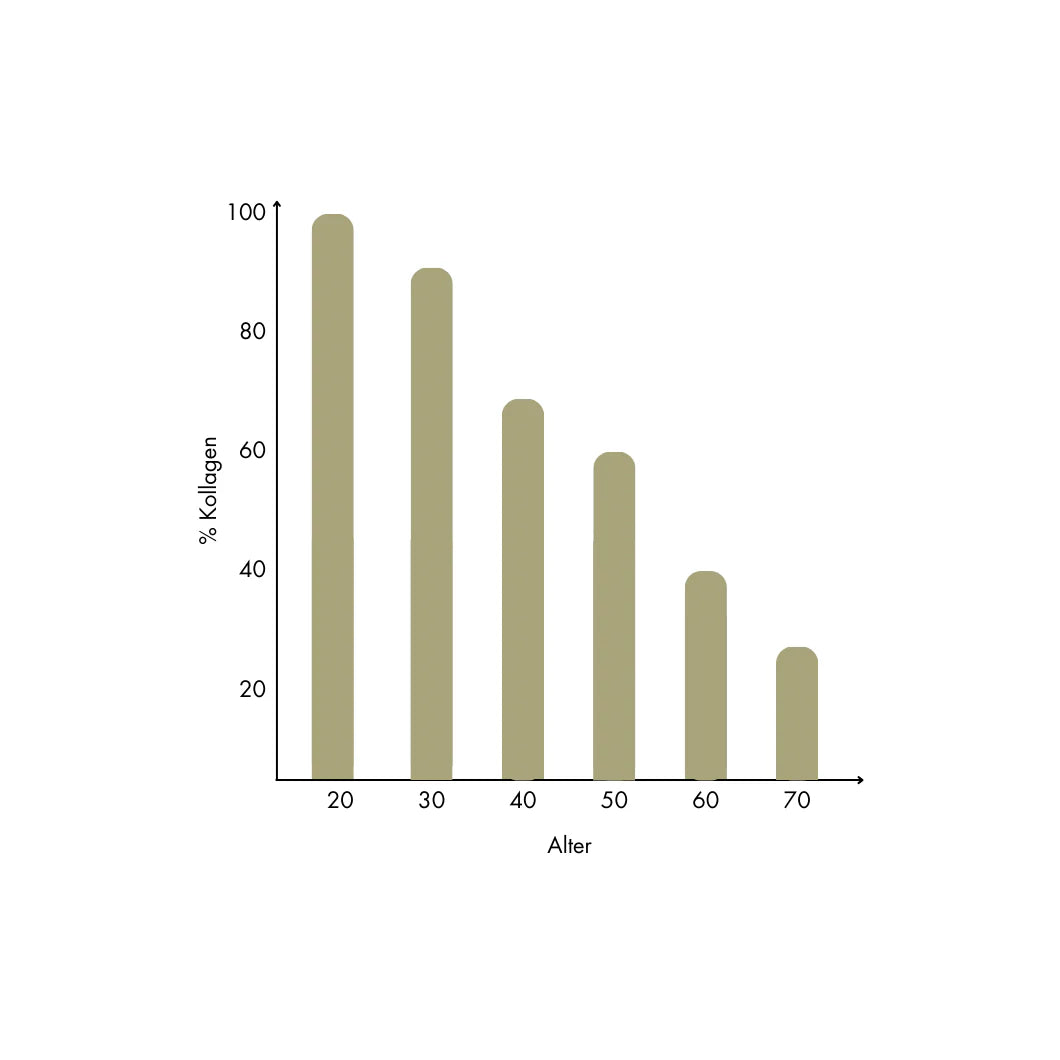
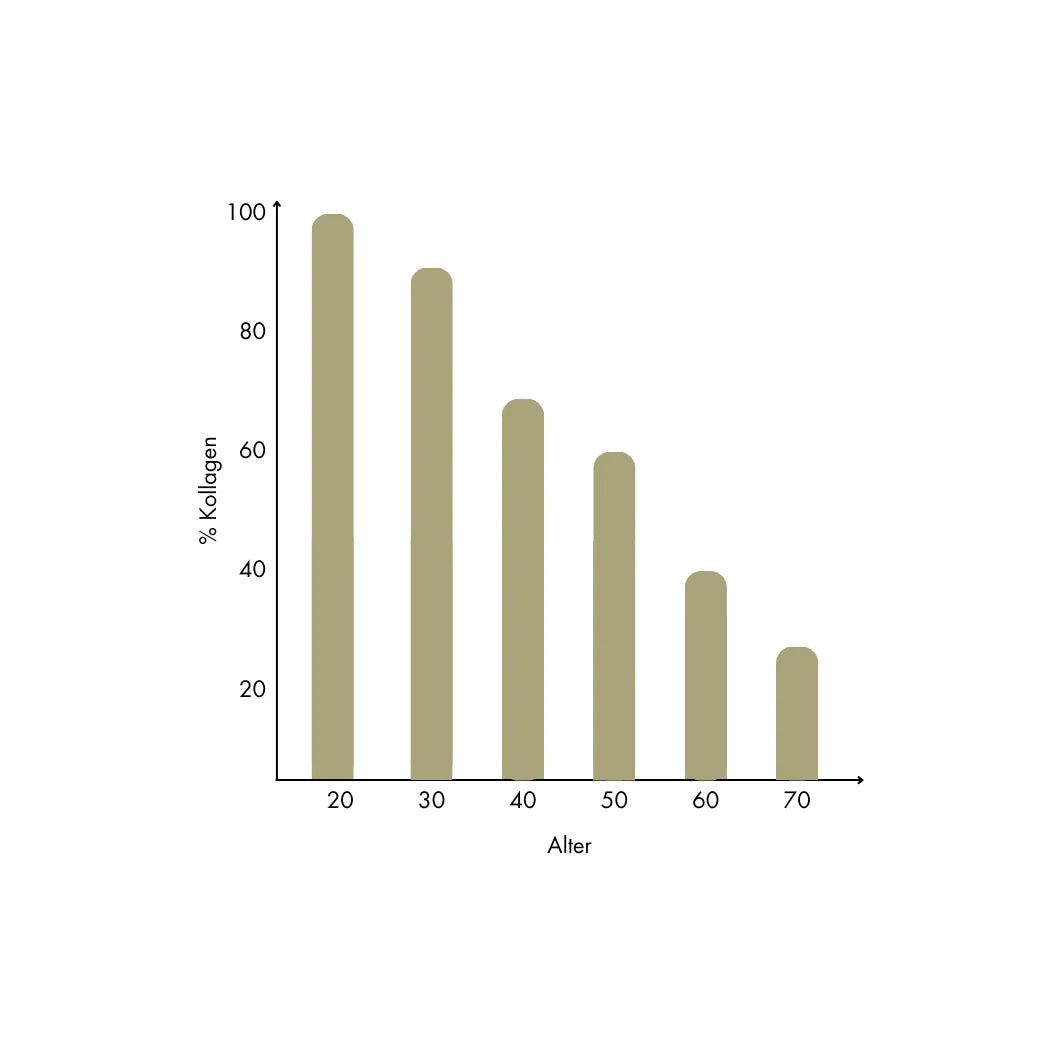
Our body produces less collagen over time
The body's own collagen production usually begins to slowly decline from the age of about 25. This process continues over the years and becomes more pronounced as we age. This has a negative impact on the aging process and the health of the skin and bones.
How biomimetic collagen is created®
Unlike collagen from animal sources (e.g. fish, pork, beef), our biomimetic collagen® is 100% derived from plant sources. It is produced using a patented, multi-step fermentation and microencapsulation process.
The fermentation process makes it possible to obtain the exact combination and ratio of the desired amino acids.
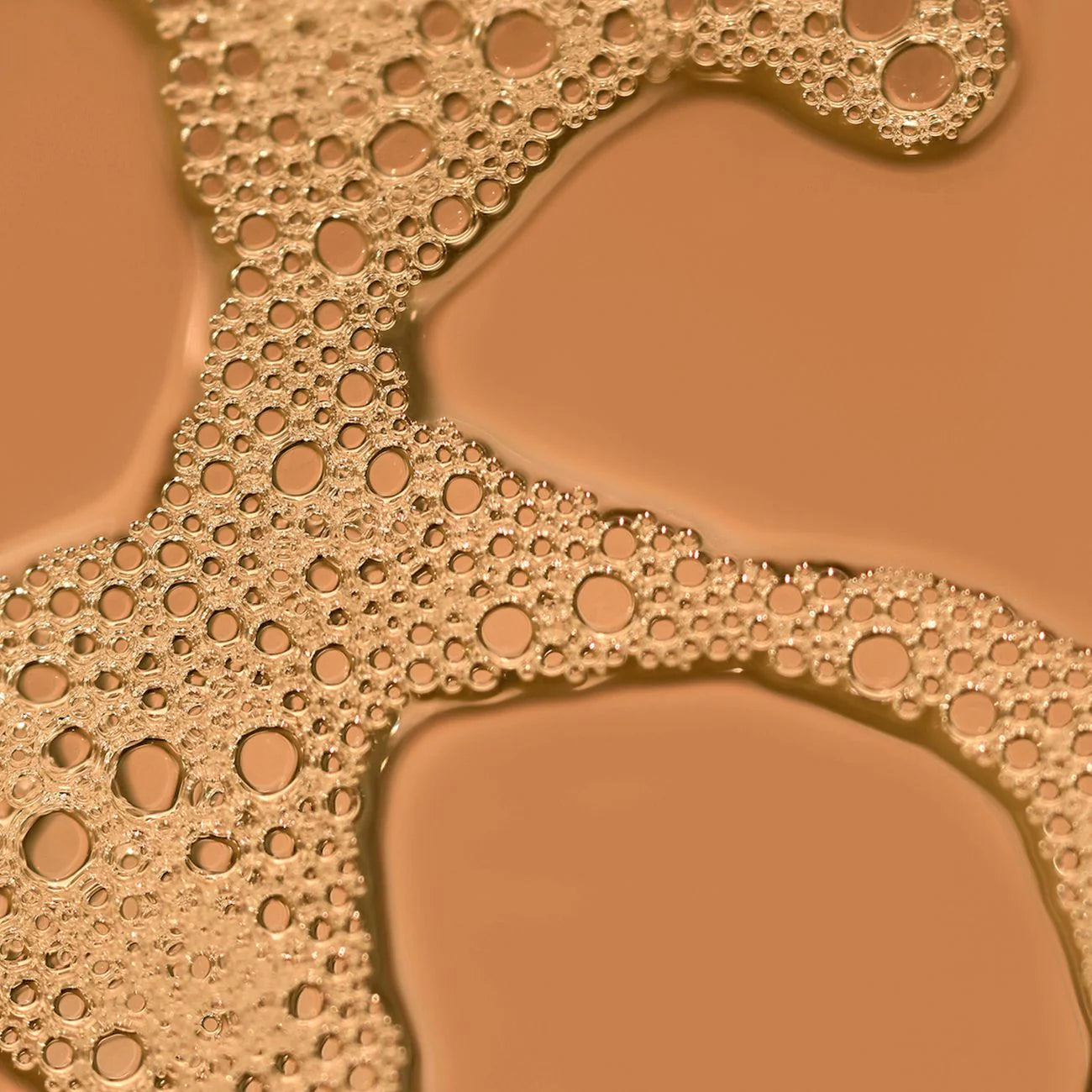

(1) Nutrients: https://doi.org/10.3390/nu11102494
(2) Nutrients. https://doi.org/10.3390/nu10010097
(3) Orthopaedic Journal of Sports Medicine: https://doi.org/10.1177%2F2325967118804544
(4) Biological Trace Element Resewarch: https://doi.org/10.1007/s12011-023-03631-1
(5) Linus Pauling Institute: https://lpi.oregonstate.edu/mic/minerals/manganese
(6) Clinical, Cosmetic and Investigational Dermatology: https://doi.org/10.2147/CCID.S141845
(7) Plastic and Aesthetic Research: https://doi.org/10.20517/2347-9264.2020.153
